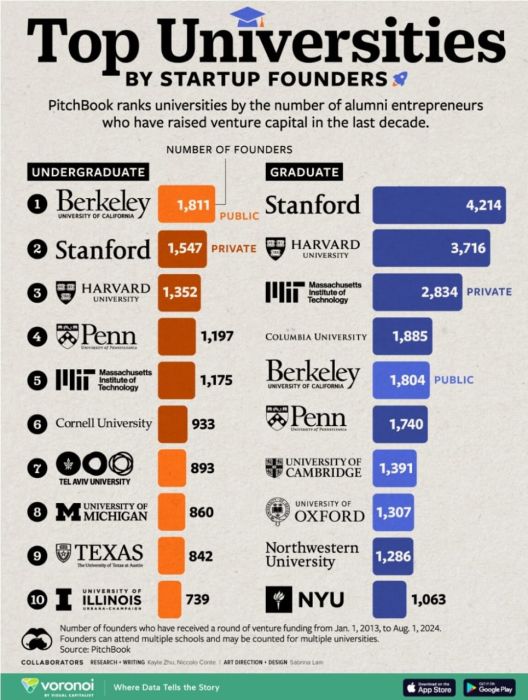Universities as Incubators of Innovation: Their Crucial Role in Nurturing Startups
Posted 1 year ago
A recent article by Kayla Zhu, "Which Universities Produce the Most Startup Founders?" highlights the world's top institutions' contribution to their national ambit and global economy. Regarding undergraduate programs, American universities are in the top ten list; however, looking at the graduate programs, besides eight American universities, the University of Cambridge and the University of Oxford are in seventh and eighth positions, respectively.
Universities are emerging as critical incubators for startup ventures. No longer confined to traditional teaching and research roles, these institutions are now positioning themselves at the forefront of entrepreneurial ecosystems, bridging the gap between academic knowledge and marketable innovation.
Entrepreneurial universities have an impressive impact on generating startups. These institutions offer a unique blend of resources, cutting-edge research, a pool of talented students, and a collaborative environment that provides fertile ground for the birth of new ideas. More than just intellectual hubs, universities today are increasingly embracing the role of business incubators, fostering a culture where students and faculty are encouraged to think beyond the classroom and explore real-world applications of their work.
Consider the success stories of leading global institutions. Silicon Valley, the world's most renowned startup ecosystem, owes much of its success to Stanford University, a launchpad for companies like Google, Hewlett-Packard, and LinkedIn. MIT's Media Lab has birthed countless innovations that have transformed industries. In Europe, institutions like the University of Cambridge have developed successful incubators and accelerators that nurture startups with high growth potential.
However, the university's role extends beyond just providing resources. They cultivate a mindset essential for entrepreneurship: the willingness to experiment, fail, and try again. The academic environment, with its focus on research and exploration, mirrors the iterative nature of startup development. Faculty members, with their domain expertise, often serve as invaluable mentors, guiding fledgling entrepreneurs through translating a concept into a viable business.
Moreover, the entrepreneurial ecosystem fostered by universities often brings in industry connections, venture capitalists, and seasoned entrepreneurs, creating an integrated support network. This ecosystem provides budding entrepreneurs with the tools to grow their ideas into successful ventures, not just funding but also mentorship, business acumen, and market access.
Governments, too, recognize universities' pivotal role in generating startups. Many are investing in university-based research and entrepreneurship programs, realizing that innovation hubs within academic institutions can help spur economic development, job creation, and technological advancement. The ripple effects of a thriving startup ecosystem driven by university involvement extend beyond the campus, benefiting local economies and industries.
Yet, this is not a model exclusive to elite institutions. Universities worldwide are increasingly making entrepreneurship a key part of their mission. From emerging tech hubs in Asia to innovation clusters in Africa, universities are stepping up to lead in nurturing startups that address local challenges, whether in healthcare, energy, or education. The startup boom in developing countries underscores the universal relevance of this model, demonstrating that when universities embrace entrepreneurship, they contribute to both economic empowerment and social impact.
But there is still room for growth. Many universities need to shift from passive supporters to active facilitators of entrepreneurship. Investing in incubators, accelerators, and seed funding programs can help transform the potential within academic walls into tangible innovations. Additionally, forging stronger connections between universities and industries can ensure that startups address real-world problems and have the market insight to thrive.
Universities must also look inward, cultivating a campus culture encouraging risk-taking and innovation. This involves breaking down the traditional silos between disciplines, promoting interdisciplinary collaboration, and fostering an entrepreneurial mindset among students and faculty alike. In doing so, universities can become breeding grounds for the next generation of innovators.
According to Prof. Dr. Muhammad Mukhtar, Vice Chancellor of the National Skills University Islamabad, universities' role in generating startups will only become more critical as the global economy continues to evolve. By embracing their role as incubators of innovation, these institutions are not just shaping the future of entrepreneurship but driving economic progress. He further exemplifies the National Skills University Islamabad, which he is leading. "Universities must open themselves for public services to generate revenues for their sustenance."





